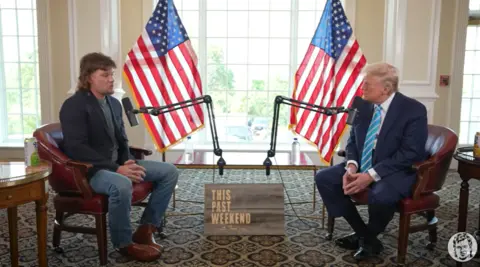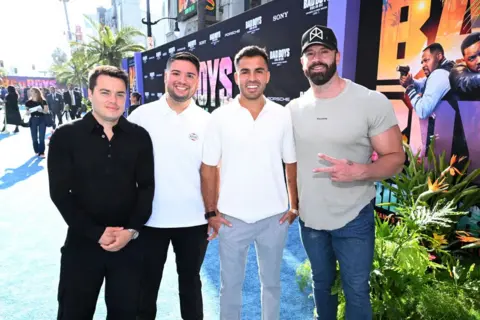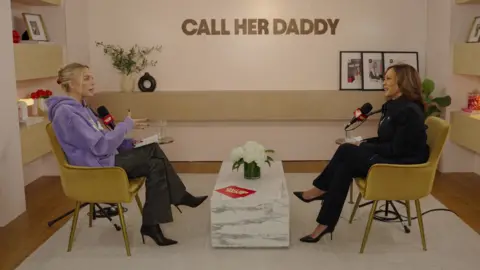Trump talks MMA and golf in podcast push for young male voters

 Theo Von / YouTube
Theo Von / YouTubeDonald Trump has appeared on many shows with a large audience of young men, sat down to interviews with influencers, comedians and podcasters outside of the mainstream political media. What is his strategy?
About 15 minutes into Donald Trump’s interview with comedian Theo Von, the conversation turned to an area rarely heard on the stump.
“I had an older brother who taught me a lesson, not to drink. Do not drink, and do not smoke,” said the former president. “I loved him so much… And he had an alcohol problem.”
“I’ve been in recovery for the last 10 years,” Von replied. “Drugs and alcohol.”
Trump seemed genuinely interested.
“What’s wrong?” he asked. The two continued to talk extensively about addiction and the drug industry.
The politics weren’t entirely there — within minutes Trump was back talking about his complaints about the “deep state” and the voting system — but the friendly conversation was a good example of the campaign’s larger strategy.
Trump has held a series of interviews with podcasters and other media outlets in a concerted effort to reach young men.
While this tactic isn’t new — for months, starting last year, Trump has been featured in other male-dominated media outlets with large audiences — it’s become more important in the final stages of this election.
In August the Trump campaign told reporters to target a key group of voters that make up just over a tenth of voters in swing states. They are mostly young men, and most of them are white, but the group includes more Latinos and Asian-Americans than the general population.
And they believe they can reach these swing voters by featuring Trump on shows hosted by the likes of Von, internet pranksters the Nelk Boys, YouTuber Logan Paul and Adin Ross, a live streamer who has been repeatedly banned from sites for violating profanity rules.
The Nelk Boys are reportedly leading a voter registration campaign on behalf of Trump who they hope will reach like-minded people.
 Getty Images
Getty ImagesWhile they may not exactly be household names in the mainstream media world, these podcasts have an audience of millions. Von’s Trump interview has nearly 14 million views on YouTube.
Polls show that the gender gap among young people has widened since Kamala Harris was elected to the Democratic Party in July. Overall the vice president seems to be attracting more young people to his camp – but his support among young women has risen faster than his support among men.
A recent Harvard Youth Poll shows 70% of women under 30 support Harris, while 23% plan to vote for Trump. Among men of the same age, 53% back Harris and 36% support Trump.
Daniel Cox, director of the Survey Center on American Life, part of the conservative American Enterprise Institute, says the political gap reflects a deep social divide that has left many young people feeling that few politicians care about them.
“Trump is very good at turning things into zero-sum games,” Mr Cox said. “Young men are trying to understand their place in a society that is growing rapidly, as a group that is struggling academically, with mental health challenges and an increasing rate of suicide.
“These are things that are really worrying and there is a sense in the political environment that no one is standing up for themselves,” he said.
But Trump’s podcast tour is not a question of policy, Mr Cox said, and more about “emerging” and speaking in a different style to a different crowd.

An attempt to change the vibe is visible in his recent podcast interviews, where the former very liberal president leads with a discussion of golf and mixed martial arts and Maga-world policies – Trump’s slogan of Make America Great Again often means America-first. way of speaking – it is assumed that there is good sense rather than controversial topics to be divided and discussed.
Before the hypnotic interview on Von’s show, Trump praised Ultimate Fighting Championship contenders including Dustin Poirier, showing more than a casual knowledge of the sport.
“Boy, I’ll tell you, he’s a hero,” Trump said, “The man he was fighting was tough … as that fight went on, he just got tougher and tougher.”
Von didn’t back down — and in fact eagerly agreed — when Trump made a series of unsubstantiated and erroneous statements about voting, immigration and the border, including saying that “thousands of thousands of murderers” had entered the country.
In the podcast cage, there is a lot of confusion, but sometimes the hosts seem surprised, disdainful or scared. Before one interview, the Nelk Boys videotaped themselves downing cans of their boozy seltzer to calm down before Trump entered the room.
But their audience doesn’t want tough questions or detailed policy positions.
“A lot of young people don’t want hard news,” said Mr Cox. “Their interests may be crypto or video games, and politics comes later – through the side door, not the front door.”
 Getty Images
Getty ImagesThere are other signs that Trump is making a strong pivot to male voters — for example filling the floor of the Republican National Convention with the likes of Kid Rock, Hulk Hogan and UFC CEO Dana White, instead of being introduced — as he has at conventions. past. – about his daughter, Ivanka.
Judging from the comments in the podcast interviews, many viewers and listeners have already backed the former president, but getting them to the polls could be a real challenge.
Youth voting rates generally lag behind, with young men tending to vote at lower rates than young women.
The Harris campaign also created a podcast of its own, aimed at young women. The vice president recently appeared on the popular sex and relationship song Call Her Daddy, where he also faced some silly questions.
 Reuters
ReutersGarrett, a Logan Paul fan from Houston in his early 20s, runs his own YouTube channel under the name Spy Jay.
He said he found Paul’s style – “being a Maverick” – attractive, and before watching the interview he had a positive opinion of Trump, calling him “a patriot who wants to bring the country back to a better state than before”.
“But the persecution he is facing, even though there is an endless intention in the media to rewrite who he is and what he stands for, means a great evil in the game,” he said. “And that makes me feel more inclined to be open-minded about voting for him.”
Watching Trump on Paul’s podcast – the internet star asked Trump if he ever fought – and Trump’s interview with Adin Ross, only confirmed his views, Garrett told the BBC.
Garrett said he thinks young Americans are getting more involved in politics, and that Trump is entering the media space “like no other candidate has”.
“So whether it’s a good idea or a bad idea, it’s going to reach a few young people,” he said.
Online responses to the video have been broadly positive. “No one can convince me that Trump is not just a bro when it comes down to it,” said one, while another read “Love or hate Trump, but he knows how to make an interview interesting”.
But some experts question whether Trump has much room to expand his voting base among male subcultures, where he has long been supported.
“Trump seems to have taken on the mannospheric and hypermasculine over-25s, so this is a late and difficult attempt to be useful,” said Jack Bratich, a journalism professor at Rutgers University who studies male-heavy spaces known as “the manosphere”.
Young men online were especially active during the 2016 election campaign, when political memes and extremist message boards like 4chan came to the fore, Bratich said.
The situation is very different eight years later, he says, “with the exception of an identifiable right-wing youth political movement focused on the Internet” that is heavily involved in this year’s contest.
However, he notes that the risks are small and the rewards could be big for Trump.
Whether it is successful will depend on convincing young men who do not want to enter politics to go to the polls.
Like many things in this election, the games for young voters are full of unknowns.

Source link




